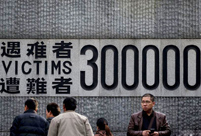 Maritime Silk Road Luxuries of the Han Dynasty
Maritime Silk Road Luxuries of the Han Dynasty
 Ceremony in honor of Confucius held in Sichuan
Ceremony in honor of Confucius held in Sichuan
 Hollywood blockbusters heats up fashion show in NW China
Hollywood blockbusters heats up fashion show in NW China
 Ciao! Chinese beauties!
Ciao! Chinese beauties!
 Naughty polar bear waves to photographer in Wapusk, Canada
Naughty polar bear waves to photographer in Wapusk, Canada
 An eye feast: BFA freshmen registration
An eye feast: BFA freshmen registration
 Top 10 most lavish weddings
Top 10 most lavish weddings
 Most amazing chi-pao beauties
Most amazing chi-pao beauties
 Observe the earth from space
Observe the earth from space
 Chinese lingerie brand arrives in Las Vegas
Chinese lingerie brand arrives in Las Vegas
WASHINGTON, Sept. 4 -- China has progressed to an economy driven by service sectors where a given unit of growth creates a lot more jobs than in the past, the International Monetary Fund's (IMF) mission chief for China told Xinhua in a recent interview.
"Ten to 15 years ago, to create 1 million jobs, China needed 1.4 percent GDP growth. Five to 10 years ago, it needed 1 percent. Now it only needed 0.8 percent GDP growth," said Markus Rodlauer, who had chaired IMF's China mission for years, adding the world does not have to get too nervous when China's growth declined to more moderate growth.
"We have seen the major structural changes from an industrial economy to a service economy, this is progressing gradually. We have seen consumption growth quite steady at 9 or 10 percent every year, slightly higher than the GDP growth," he noted.
Talking about China's economic rebalancing, Rodlauer said the result is mixed. While some other countries are impatient with China's market-based economic reform agenda, he said, it is unrealistic and unnecessary to expect drastic changes taking place overnight.
"China has already progressed quite significantly in rebalancing. Let's not forget the current account surplus was over 10 percent of GDP just five to seven years ago. That has gone away with the current account surplus was down to 2 percent, because domestic demand has grown, export demand has weakened," he said.
But he also pointed out that investment still accounts for nearly 50 percent of China's GDP growth, and this proportion should be lowered to around 30 percent. Investment should also be transformed from the one led by government to that driven by private sector with smaller scale and providing more services.
"All the reforms hanging together, making the economy more productive and taking Chinese households to take most of the output for themselves. There is a long way to go, but it doesn't come overnight," he said.
Rodlauer said China needs to change, but change is difficult and does not have to come overnight. "We need a strong and stable China," he added.
 "Twin flowers" bloom in the air
"Twin flowers" bloom in the air China names 80 Anti-Japanese War memorial sites
China names 80 Anti-Japanese War memorial sites The 4th China-Eurasia Expo opens in Urumqi
The 4th China-Eurasia Expo opens in Urumqi Tall girls shine at model competition
Tall girls shine at model competition Girl who cannot gain weight: She is 1, 2.9 kilograms
Girl who cannot gain weight: She is 1, 2.9 kilograms Bazinga! Watch out the 'facekini' fashion bomb attack
Bazinga! Watch out the 'facekini' fashion bomb attack Experiencing maiden voyage between Sanya and Xisha
Experiencing maiden voyage between Sanya and Xisha Chinese inflatable aircraft meets public for the first time
Chinese inflatable aircraft meets public for the first time People enjoy delicacies in Tianjin undersea tunnel
People enjoy delicacies in Tianjin undersea tunnel COMAC jumbo jet and its global rivals
COMAC jumbo jet and its global rivals Capital Spirits: the capital's first liquor bar
Capital Spirits: the capital's first liquor bar Chengdu International Auto Show
Chengdu International Auto Show 2014 int’l drone exhibition
2014 int’l drone exhibition Trainings taken by Chinese navy divers
Trainings taken by Chinese navy divers Female PLA honor guards
Female PLA honor guardsDay|Week|Month